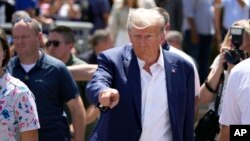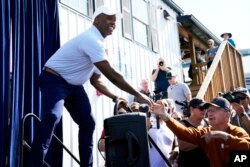Just days before the first debate of the Republican presidential primary, a new poll shows that former President Donald Trump maintains a commanding lead among GOP voters in the state of Iowa, the first state to vote in the party's selection of a nominee for the 2024 election.
The poll, sponsored by the Des Moines Register and NBC News, found that Trump is the first choice for the nomination of 42% of Republicans likely to participate in the state's January Republican caucus. Trump's nearest challenger, Florida Gov. Ron DeSantis, has the support of 19% of Iowa Republicans, while none of the other 12 candidates mentioned in the poll were able to break into double digits.
Trump is feeling enough confidence in his position in the primary that he confirmed over the weekend that he will not participate in Wednesday’s debate, scheduled to take place in Milwaukee, Wisconsin.
The former president’s strength in Iowa is all the more remarkable given that in the 2016 primary, during his first run for the presidency, he only managed a tie for second place in the state.
Indictment may have helped
In news that may bode even more poorly for Trump's adversaries, the former president's support in Iowa remained strong even though his indictment in Georgia on charges of conspiring to subvert the results of the 2020 presidential election was announced August 15, while the poll was in the field.
When the results of the poll were analyzed, they revealed that 38% of respondents polled in advance of the indictment's release supported Trump. After the indictment, support for the former president rose to 43%.
Because the caucus remains several months away, the poll also set out to measure the firmness of candidates' support by asking respondents whether they feel that their minds are already made up, or if they could still be persuaded to change their allegiance. The results suggest that Trump's support is firmer than that of DeSantis, with 66% of the former president's supporters saying their minds are made up, versus 31% of the Florida governor's backers.
Remaining field
Of the remaining 12 Republican candidates who have declared their candidacy for the nomination, South Carolina Sen. Tim Scott performed the best, with 9% of the vote. Former Vice President Mike Pence and former South Carolina Gov. Nikki Haley each earned 6% of the vote, while former New Jersey Gov. Chris Christie took 5% and businessman Vivek Ramaswamy received 4%. No other candidate received more than 2% of the vote.
Kyle Kondik, managing editor of Sabato's Crystal Ball at the University of Virginia's Center for Politics, told VOA that while the results of the Des Moines Register poll are similar to other results recorded by pollsters in Iowa, it carries more weight because it was conducted by J. Ann Selzer, president of Selzer & Co., who has a reputation for accuracy in the state.
"She's a very respected pollster, and so that is why this particular survey is getting a lot of attention," Kondik said.
Kondik pointed out that Trump's performance in Iowa is actually somewhat weaker than it is in national polling, where he regularly leads DeSantis by margins of more than 40 points. However, he said, the fact that Trump is doing so well in Iowa after losing the 2016 caucus there, speaks to the former president's overall strength.
"Trump is probably weaker in Iowa than he is nationally, but he's still really pretty strong," Kondik said.
Kondik urged some caution when it comes to analyzing the apparent surge the former president enjoyed after the August 15 announcement of his Georgia indictment.
"The indictments have not hurt Trump amongst Republicans, and in fact, arguably, may have helped by prompting people to 'rally around the flag' for him," Kondik said. "Maybe over time, you see that reverse, and maybe people get cold feet about Trump and are concerned about him as a general election candidate. But again, there's really no evidence from this poll or other polls to suggest that that's happened."
Evolution of the GOP
The fact that Trump has moved from an undistinguished second-place finish in Iowa eight years ago to a double-digit lead today highlights the degree to which the former president has remodeled the Republican party in his own image, said William A. Galston, a senior fellow in the Brookings Institution's Governance Studies program.
"Donald Trump's presidency, including its very, very troubled ending in January of 2021, succeeded in cementing the intense relationship he has with the base of the Republican Party," Galston told VOA. "As far as they're concerned, he can do no wrong. He has been forgiven sins that would sink any other candidate."
Galston said that the poll results also cast serious doubt on the ability of DeSantis to mount a serious challenge to Trump.
"Ron DeSantis, who was supposed to be his principal challenger, has not succeeded in strengthening his position in recent months," Galston said. "If anything, he has weakened, very, very significantly, opening the door for someone else to emerge as the leading challenger."
He added, "the field could consolidate enough around someone not named Ron DeSantis to pose a significant challenge to Donald Trump down the road."
Why Iowa matters
Iowa has long had an outsized role in the process by which the U.S. selects its president, even though it is both smaller than most states, and has a population that is 83% white, making it one of the least diverse.
Traditionally, the Iowa caucuses have been seen as a vital early test of presidential candidates — one that puts a premium on face-to-face interactions with voters. The caucus format requires voters to assemble at designated sites across the state and to publicly declare their support for a specific candidate, a level of commitment not required in most states, where primary votes are conducted via secret ballots.
Iowa voters do not have a particularly good track record of choosing the ultimate GOP nominee. Trump tied for second place in the 2016 caucus, and the party's eventual nominee has not won a well-contested Iowa caucus outright since 2000. (Trump won 97% of the vote in 2020, facing only a handful of little-known challengers.)
However, what Iowa has often done is serve as the first cut in culling over-large primary fields. In past years, many candidates that performed poorly in the states have terminated their campaigns within days of the vote.







